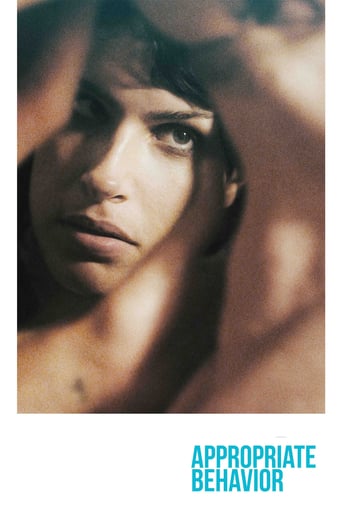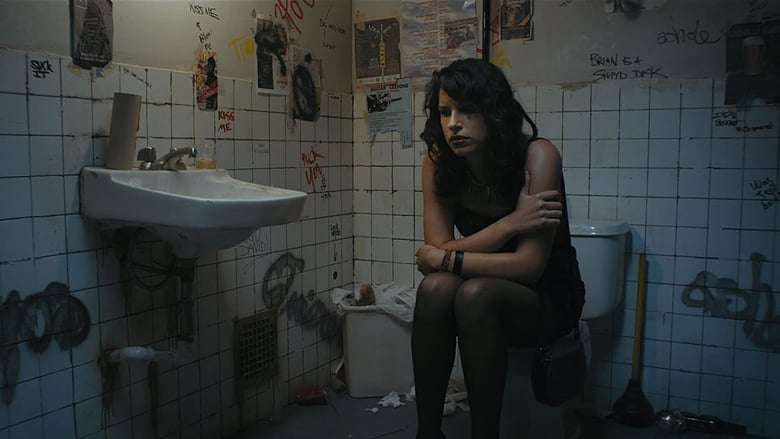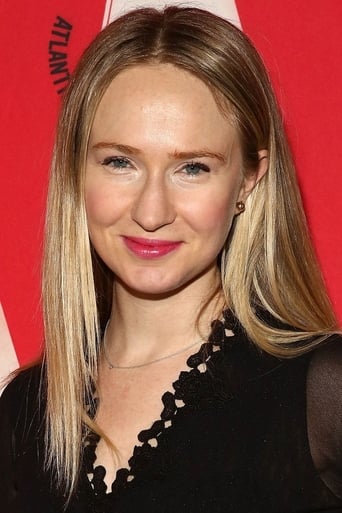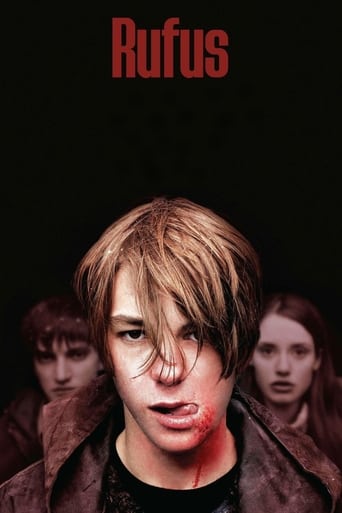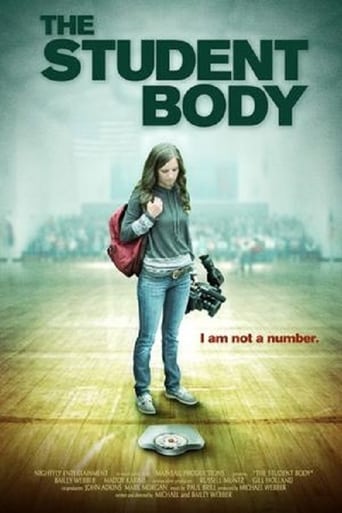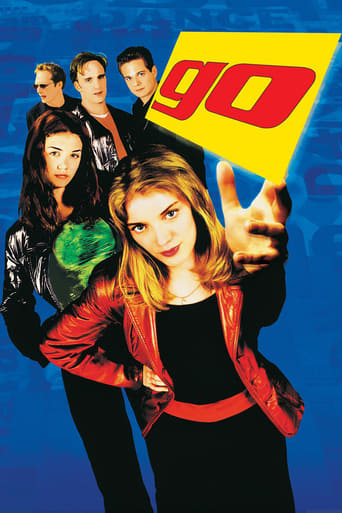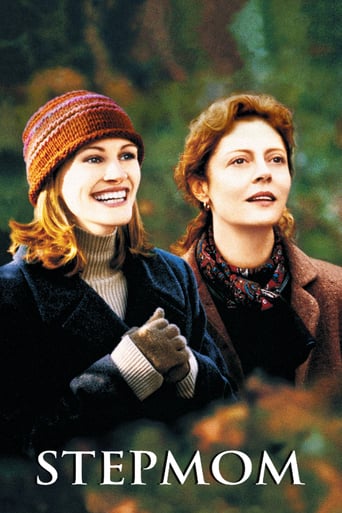Appropriate Behavior (2015)
Shirin is struggling to become an ideal Persian daughter, politically correct bisexual and hip young Brooklynite but fails miserably in her attempt at all identities.
Watch Trailer
Cast


Similar titles
Reviews
If you don't like this, we can't be friends.
hyped garbage
A movie that not only functions as a solid scarefest but a razor-sharp satire.
By the time the dramatic fireworks start popping off, each one feels earned.
I was excited to see this indie and for a low budget film in NYC it is quite well done. Being that is was a Sundance film I was expecting something really revelatory. Unfortunately it really wasn't. It took a long time to get going. The whole first half of the film was essentially exposition in the form of complaining. Nothing was really happening to the characters. They weren't doing or experiencing anything. Instead we learn the characters history as she complains about losing her girlfriend to friends and deals with her family dynamic. While none of that is bad per say, it certainly wasn't that engaging.The film picks up speed after that and we get to see our lead actually experience things. However the star/writer/director utilizes flashbacks to tell the tale of how she got here, but the cuts backward and forward have no style, they are just cuts. So the film feels awkward and you get confused as to where you are in time too easily. Maybe it was intentional, as the lead is really off kilter as her life is put in shambles. But for this viewer, it didn't really work. You always eventually figure out where the timeline is, but it takes a while into each new scene to know. There are many ways to make flashbacks and jumping around in time work for an audience, but none of them are used and therefore it's all just basic editing and cutting and it feels clunky.In conclusion, this is a competent first feature. You have to commend anyone who finishes a feature and does so competently. It isn't a perfect movie, but what is? It could have used some more work with the script and structure. Visually it's fine, but again not a revelation in indie cinematography. Can't really fault them for that though, as you only have just so many locations and it is mostly people talking. If you get too artsy with that it can be detrimental to the simple story being told. If you like indies and new filmmakers you could definitely do worse, but you can also definitely do better. For other films in this vein, millennial, edgy indie, OBVIOUS CHILD is far stronger.
"Appropriate Behavior" is written and directed by Desiree Akhavan, a bisexual Iranian-American woman, who stars as Shirin, a Brooklyn native, attempting to rebuild her life after breaking up with her girlfriend Maxine. One is struck by the delightful irreverence of Ms. Akhavan, who has few guilt feelings in acting upon her sexual desires. The plot features encounters with men, women and a menage a trois with a latex- loving couple.In addition to her sexual life, Akhavan informs us of Shirin's family life, which includes verbal tussles with her more "successful" physician brother over revealing her bisexual predilections to her traditional Iranian-born parents. Shirin also takes a job teaching pre-kindergarten students how to use a video camera and create short films.Diego Costa writing in "Slant Magazine," notes that Shirin doesn't really fit into the Iranian-American community she was born into or the lesbian sub-culture she aspires to be part of: "Iranian-Americans are depicted as only able to communicate by gossiping and "reading," whereas cosmopolitan queerness is presented as a bubble of self-important and pseudo-intellectual regurgitation. The ethnic and sexual communities she's supposed to belong to appear to suffocate Shirin, as their original role of sheltering give way to an orthodoxy that erases the singularity of human subjects. Thankfully, for the audience and for herself, Shirin is able to transform this lack of harmony not into bitterness, but into an opportunity to articulate her own awkwardness."Stephanie Merry in the "Washington" Post believes that it's Akhavan's sense of self-deprecating humor that makes her writing stand out: "Shirin is relentlessly self-effacing. When someone tells her she could be a model, she says, "Yeah, a before model for Accutane." But Akhavan has great comic timing and a wonderful screen presence that, much like Dunham's, is not at all self-conscious. In that same vein, Akhavan doesn't shy from stripping down or putting herself into scenarios, sexual and otherwise, that will make some viewers squirm."For Sheila O'Malley at "RogerEbert.com," when Shirin remarks, "Can you tell I'm dead inside just by looking at me?", that's an example of the "deadpan" tone throughout the film. O'Malley insists that, "The appeal of the relationship with Maxine is never really evident in the film, and that is one of the flaws of the deadpan approach." She describes the relationship with Maxine (told through flashbacks) as "all-consuming, and Shirin has sentimentalized it in memory, telling a friend, "We were an It Couple." Maxine is self-righteous and judgmental, cloaked in identity politics. On their first meeting, Shirin, drunk, wearing a tiara at a New Year's Eve party, looks at Maxine's rather severe outfit and says, "I love dykes." Maxine tells her how offensive that word is. Shirin is baffled. She meant it as a compliment." O'Malley likes Akhavan's "awkwardness" and "defense mechanisms." O'Malley also echoes the theme of Shirin having difficulty fitting in: "Maxine thinks Shirin is a tourist in the gay world. But Shirin is a tourist everywhere: that's the problem."Andrew O'Hehir in "Slant Magazine" sees that Shirin's refusal to come out of the closet is by no means a selfish act: "In 21st-century Brooklyn-political terms, we're supposed to see Shirin's refusal to come out as an act of cowardice. It's that too, but Akhavan also makes us feel that Shirin's willingness to allow her parents their circumlocutions and obfuscations – they know without knowing, accept without discussion, tell themselves lies they know to be lies – is in its own peculiar way an act of generosity. If this is a familiar kind of film with a familiar setting and a familiar resolution, that intense delicacy makes it clear that its creator is an unusual talent."Katie Walsh in "The Playlist" makes a good case that Akhavan mainly is promoting a "be yourself" (with all one's attendant flaws) philosophy: "This is expertly demonstrated in the silly and hilarious movie that Shirin makes with her band of five-year-old boys, as embracing exactly what they want to do allows her to see the merit in embracing exactly what she wants on her own terms. What we understand from this, even in all of its scatological glory, is the cathartic power of filmmaking in representing and understanding one's own identity."Eric Kohn in "Indieworld" can't help but argue in substance that "Appropriate Behavior" is optimistic to the core: "Despite its protagonist's rapid-fire cynicism, the movie is never consumed by pessimism. As it stretches back to Shirin's initial courtship with Maxine, Akhavan smartly reinforces the nature of their bond: The older, confident Maxine escapes the anxieties of growing older through Shirin's blind idealism, while Shirin identifies Maxine's ire as a form of fashionable snark that the younger woman admires. During their initial flirtation, Shirin gushes, "I hate so many things, too!" The exchange initially reads as heartwarming but in retrospect also points to their eventual discord."Despite all the accolades, "Appropriate Behavior" does have a few shortcomings, particularly in its underdeveloped portrait of the protagonist's parents. In addition, David Rooney, writing in "The Hollywood Reporter" found the ending to be abrupt: "While her pit stops frequently suggest a bi-now/gay-later woman destined to shed that denial, the story's soft resolution merely settles for a vaguely consolatory "she'll-be-fine" shot as a cue to the standard closing blast of whimsical indie rock."Stephen Holden of "The New York Times" perhaps sums it up best: "for all its disorganization and lack of an ending or even a sense of direction, "Appropriate Behavior" is alive. The screenplay is packed with smart remarks, clever and unpredictable turns of phrase that knock you off balance. Little set pieces in which Shirin goes shopping for sexy lingerie and takes part in a gay-rights discussion group give you the flavor of a neighborhood in which everyone has an edge. A stoned, laid-back attitude is not the same thing as relaxation."
Greetings again from the darkness. It's finally here! That is, if you have been anxiously awaiting a twist in the New York hipster Romantic Dramedy genre; and if the twist you want is a semi-autobiographical story of a Persian bi-sexual female whose focus in life is making her ex-partner jealous, while hiding the truth from her own conservative parents.Desiree Akhavan is the first time writer/director who also stars as Shirin, the lead character described above. Ms. Akhavan and the movie owe so much to Lena Dunham ("Girls") that the opening credits should have had a placard stating "Inspired by Lena". There is no shame in crediting those who influence one's work. We also see touches of Woody Allen and Nia Vardalos in Akhavan's writing, and Greta Gerwig in her acting style. What we haven't seen before, is an opening scene depicting the leading character breaking up with her partner and walking down the street toting her strap-on.Shirin is a twenty-something New Yorker who is insecure and judgmental, cynical yet hopeful, lacking in self-esteem, without any discernible professional talent or social skills, and void of any ambition other than making her ex, Maxine (Rebecca Henderson) so jealous that she will come running back. Her "plan" is to sleep with many strangers of both sexes until one of these trysts makes Maxine see that she can't live without Shirin. She does all of this while dodging poverty working at a kindergarten teaching filmmaking to 5 year olds. We are told Shirin has a Masters in Journalism, just so we understand she has chosen this path in life.As a filmmaker, Ms. Akhavan shows real promise. Her feel and eye for crucial scenes between two people is very strong, though the dialogue could have used some help – many of the one-liners probably sounded funnier in her head than they come across on screen. Her use of flashbacks was especially creative as she juxtaposed good and bad moments of Shirin/Maxine with what's happening at any given moment. The sexual escapades and the unique community of New York hipsters will probably prevent this from any type of mainstream success, but it should provide opportunities for Akhavan as a filmmaker. Not surprisingly, as an actress, she will be appearing in the next season of "Girls".The Persian undercurrent seemed to provide the most potential for a real story of interest, though the focus on bi-sexuality more readily grabs headlines. Shirin's relationship with her parents and the Iranian community offered a chance for illumination and unique exchanges, but unfortunately most of these were glossed over for the next party or pick-up. "Persians communicate mostly through gossip" is a fascinating line that begged for more attention, and Shirin's attempt to come out while talking with her mom was well done and so deserved a follow up.Supporting work is provided by Halley Feiffer (daughter of Jules Feiffer) as Shirin's best friend Crystal. Ms. Feiffer steals every scene in which she appears, and had me wanting to learn more about her character. Scott Adsit ("30 Rock") plays the urban-stoner dad who gets Shirin her the teaching job that leads to the "Tale of the Lost Fart" – the turning point for Shirin as she finally reaches the moment when she realizes she has gotten over Maxine. The first film from an exciting new talent always brings a balance of anticipation and a reminder to keep our hopes in check. Here's hoping Desiree Akhavan has more to say.
"Appropriate Behavior" had all the ingredients I look for in an indie movie. It had characters on the margins of society in Shirin, a bisexual young woman living in New York City and of Iranian descent. It involved locations I will never know well, the aforementioned New York City as seen by the young and tragically hip. It explores a culture of which I'm not a part, that of the young bisexual/gay/lesbian/transgender person living in a big city.Etc. etc. etc.I was all ready to enjoy the heck out of this film at the Key West Film Festival in November 2014. I even skipped another movie that my group was attending and which sounded great. All so I could see something I normally wouldn't have seen in the theaters.I wish I'd gone with my group. Even worse, I managed to talk someone out of going with me instead of with the others and so I felt bad about steering her wrong.While the set up was all there, the execution sure wasn't. The main character truly only seemed interested in her own love life and gave no thought, nor screen time to anything else. For instance, her brother the doctor seemed to have an interesting side plot going on, but the movie never seemed interested in doing more than teasing the viewers. The main character's coming out to her conservative parents was hinted about and teased, but then given all the pomp and attention of a wet noodle going down the drain.Even worse, the main character was supposed to have a lead-in-to-the-third-act epiphany that led to her making changes and sowing the seeds for a happy ending. After our showing ended, the folks in my theater all talked about the movie and none of us had any clue about what the epiphany was supposed to be. Nor could we understand why or how the main character effected the change necessary for that happy ending.So many wasted ideas, so little fleshing out done. In the end, there was not enough reason for us to care.I gave this a five because I thought the acting and cinematography were relatively professional. Too bad neither were given enough substantial plot nor complications to help them live up to their potential.

